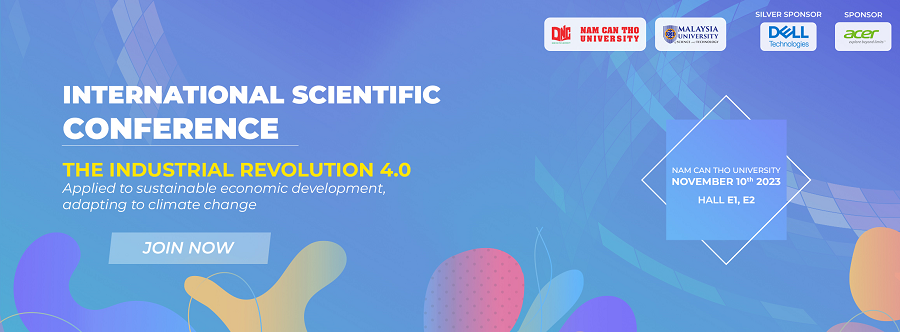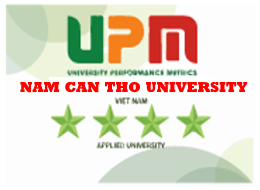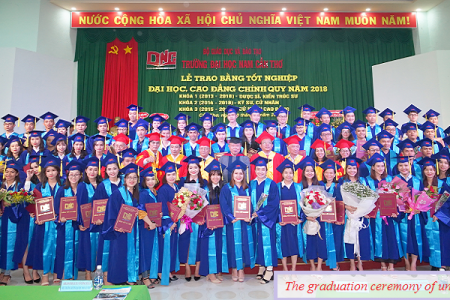Nov 08,2023
Industrial Revolution 4.0 - Application to Sustainable Economic Development, Adaptation to Climate Change

INTRODUCTION OF THE INTERNATIONAL CONFERENCE ON INDUSTRIAL REVOLUTION 4.0 - APPLICATION TO SUSTAINABLE ECONOMIC DEVELOPMENT, ADAPTATION TO CLIMATE CHANGE INDUSTRIAL REVOLUTION 4.0 - EVERYONE'S REVOLUTION
The "Industrial Revolution 4.0 - Application to Sustainable Economic Development, Adaptation to Climate Change" conference brought together experts and scholars to explore the diverse applications of Industry 4.0 and its role in fostering sustainable economic development and addressing climate change challenges. The conference proceedings covered a wide range of topics, each shedding light on different facets of this transformative era. The Fourth Industrial Revolution (Industry 4.0) marks a paradigm shift in the way we live, work, and interact with technology. Unlike its predecessors, this revolution is distinguished by its inclusive nature, making it "the revolution of everyone." The fundamental idea behind Industry 4.0 is that it is not confined to a select few; rather, it is a revolution in which everyone can actively participate and contribute to its development.
This inclusivity stems from the democratization of technology. The tools and platforms driving Industry 4.0 are becoming increasingly accessible, allowing individuals from diverse backgrounds, regardless of their technical expertise, to engage with and contribute to this transformative wave. Unlike previous industrial revolutions that were primarily driven by technological elites, Industry 4.0 empowers individuals, making technology a tool for the masses. One of the key reasons for the rapid development of Industry 4.0 is the collective involvement of people from various walks of life. The democratization of innovation allows for a diverse range of perspectives and ideas to converge, fostering creativity and accelerating the pace of technological advancement. This inclusive approach also cultivates a sense of ownership and responsibility among individuals, as they recognize their role in shaping the trajectory of this revolution.
For developing nations like Vietnam, Industry 4.0 presents a unique opportunity to leapfrog traditional stages of development and actively participate in the global technological landscape. The accessibility of digital tools, the prevalence of connectivity, and the open nature of Industry 4.0 platforms allow countries with emerging economies to overcome historical barriers and engage in the forefront of technological progress. Vietnam, with its youthful and tech-savvy population, is well-positioned to embrace the opportunities presented by Industry 4.0. The enthusiasm and adaptability of the Vietnamese people, coupled with the government's initiatives to promote digital literacy and innovation, create a conducive environment for the nation's integration into the global digital ecosystem. As a result, Vietnam can not only adopt but also contribute to the ongoing developments in Industry 4.0.
Industry 4.0's distinctive feature lies in its democratic character, where it is not the revolution of a select few but of everyone. This inclusivity propels rapid advancements and provides nations, especially those in the process of development like Vietnam, with a chance to actively partake in and benefit from the ongoing global technological revolution.
The conference attracted over 50 submitted papers, and the reviewing committee carefully selected 36 high-quality papers to be included in the proceedings of this international conference. The event drew participation from more than 18 academic institutions and research entities, including the University of Technology - Hanoi National University, Malaysia University of Science and Technology (MUST), Nam Can Tho University, Can Tho University, Tay Do University, Van Lang University, Can Tho University of Technology, Vietnam Maritime University, An Giang University, Tien Giang University, Kien Giang University, Bac Lieu University, Hanoi University of Mining and Geology, Tam Anh Hospital - Hanoi, Can Tho Electricity Testing Center, Can Tho Export Processing Zone, and AUF – Agence Universitaire de la Francophonie.
The conference attracted more than 73 authors, both domestic and international, comprising 63 scholars with qualifications ranging from master's degree or higher, 16 authors with a doctoral degree or higher, and 5 scholars holding the title of associate professor or higher.
Notably, the workshop featured the presence of Prof. Dr. Nguyen Thanh Thuy, Chairman of the Vietnam Professor Council, and Prof. Dr. Geoffrey Williams, Dean of the Institute of Postgraduate Studies at Malaysia University of Science and Technology (MUST).
The three keynotes, though distinct in their focus areas, weave together a narrative that encapsulates the essence of the Industrial Revolution 4.0. Professor Xuan's emphasis on inclusivity lays the groundwork for a revolution that involves and benefits everyone. Professor Thuy's exploration of AI aligns seamlessly with the overarching theme of sustainability, showcasing technology as a catalyst for responsible economic development. Professor Williams, by addressing the governance aspects through certification in sharing economies, adds a layer of ethical consideration to the technological narrative, ensuring that progress is not only rapid but also responsible.
In the opening keynote, Professor Vo Tong Xuan, a Labor Hero and National Teacher, sets the stage by declaring the Industrial Revolution 4.0 as a revolution that belongs to everyone. As the Honorary Rector of Nam Can Tho University, Professor Xuan brings a wealth of experience and insight into the transformative power of Industry 4.0. His keynote emphasizes the inclusive nature of this revolution, highlighting that its impact is not confined to a select few but resonates across all sectors of society. Professor Xuan's keynote serves as a rallying call for widespread participation in the technological advancements that define Industry 4.0. By framing it as "Everyone's Revolution," he underscores the democratizing potential of this industrial evolution. The notion that individuals, regardless of their background or expertise, can contribute and benefit from the innovations of Industry 4.0 is a powerful concept. This keynote lays the foundation for a collaborative and inclusive approach to technological progress, emphasizing the collective responsibility to shape a future where the benefits of Industry 4.0 are accessible to all.
[Keynote 2: Artificial Intelligence - Exponential Technology Towards Sustainable Digital Economic Development in the Future]
Professor Nguyen Thanh Thuy, from the University of Engineering and Technology at Vietnam National University, Hanoi, takes center stage in the second keynote, focusing on the exponential rise of artificial intelligence (AI) and its role in fostering sustainable digital economic development. This keynote delves into the heart of Industry 4.0, identifying AI as a pivotal force that propels economies into a future characterized by efficiency, innovation, and sustainability. Professor Thuy's expertise in AI positions him as a guiding voice on the transformative potential of this exponential technology. The keynote explores how AI, with its capacity for learning, adaptation, and problem-solving, becomes a linchpin in the quest for sustainable development. By emphasizing the integration of AI into the fabric of economic processes, Professor Thuy outlines a path where digital advancements not only drive economic growth but do so in a manner that is environmentally conscious and socially responsible. The linkage between AI and sustainability underscores a fundamental tenet of Industry 4.0—the convergence of technological progress with a commitment to long-term viability. This keynote, situated in the context of the broader conference theme, establishes a crucial connection between advanced technologies and their role in shaping a sustainable and resilient future.
Professor Geoffrey Williams, hailing from the Malaysia University of Science and Technology, brings a unique perspective in the third keynote by delving into the realm of sharing economy platforms and the strategic use of certification. His keynote addresses a critical aspect of Industry 4.0, which extends beyond technological innovation to encompass the dynamics of shared economies and collaborative ecosystems. The focus on certification as a means to enhance the impact of sharing economy platforms introduces a governance aspect to the industrial revolution. Professor Williams explores how establishing standards and certifications can play a pivotal role in fostering trust, reliability, and sustainability within sharing economies. In doing so, he brings attention to the intricate interplay between technological advancements and the need for robust frameworks that govern their application. This keynote adds a layer of complexity to the discourse on Industry 4.0 by highlighting the importance of governance mechanisms. While technological innovation drives the revolution, the strategic use of certification emerges as a key enabler for the responsible and ethical implementation of these advancements. Professor Williams' insights contribute to a holistic understanding of Industry 4.0, where the technological, economic, and regulatory dimensions intersect to shape a future that is both revolutionary and responsible.
Together, these keynotes present a comprehensive view of Industry 4.0—one that is collaborative, technologically advanced, and underpinned by ethical considerations. The interconnectedness of these narratives reinforces the idea that the revolution belongs to everyone, powered by exponential technologies, and governed by principles that ensure its positive impact on societies and economies worldwide.
In the dynamic landscape of the fourth industrial revolution, the conference proceedings on "Industrial Revolution 4.0 - Application to Sustainable Economic Development, Adaptation to Climate Change" provide a rich tapestry of insights into the multifaceted aspects of this transformative era. The diverse array of topics covered in the proceedings not only encapsulates the challenges and opportunities presented by Industry 4.0 but also highlights the interconnectedness of these themes in shaping a more sustainable and resilient global industrial landscape.
The conference begins by emphasizing the importance of cultivating a competition culture as the foundation for enhancing the competitive power of businesses in the context of Industry 4.0 ("Competition Culture - Foundation for Enhanced Competitive Power of Business in Industrial Revolution 4.0"). This foundational element sets the tone for the subsequent discussions, recognizing the role of healthy competition as a driving force for innovation and growth. A pivotal theme emerges as the conference addresses the intersection of Industry 4.0 and climate change ("Industry 4.0 and Its Contribution to Mitigation and Adaptation to Climate Change"). The discussions underscore the contribution of Industry 4.0 to both the mitigation of environmental impacts and adaptation strategies. This dual-purpose approach aligns with the global imperative to develop technologies that not only drive economic progress but also address the pressing challenges posed by climate change.
The proceedings then pivot to the broader implications of Industry 4.0, examining technological spillover from foreign direct investment and its role in sustainable development in Vietnam ("Technological Spillover from Foreign Direct Investment and Sustainable Development in Vietnam"). The development of tourism human resources in the Mekong Delta underscores the need for skill development to harness the opportunities presented by Industry 4.0. The spotlight on the recycling industry adapting to climate change epitomizes the transformative potential of Industry 4.0 in creating environmentally conscious and sustainable practices. The proceedings then delve into the analysis of technology application investment in processing and manufacturing enterprises in Vinh Long Province ("Analysis of the Impact of Technology Application Investment on Processing and Manufacturing Enterprises in Vinh Long Province"). This critical examination highlights the transformative power of technology investments in traditional industries. It explores how embracing technological advancements can lead to increased operational efficiency and competitiveness, laying the groundwork for sustainable economic development. The evolution of financial transactions in the digital era is highlighted by articles on digital payment at convenience stores in An Giang and the application of artificial intelligence in credit operations ("Digital Payment of Customers at Convenience Stores in An Giang," "Application of Artificial Intelligence in Credit Operations: From Risk Analysis to Process Optimization"). These innovations not only streamline financial processes but also contribute to the development of sustainable e-commerce platforms, reflecting the broader trend of digital transformation in economic systems.
The proceedings further explore the practical applications of Industry 4.0, ranging from the development of a cost calculation model for logistics services in Can Tho City to the integration of artificial intelligence in agricultural supply chain management ("Cost Calculation Model for Logistics Service on Digital Maps in Can Tho City," "Applying Artificial Intelligence in Agricultural Supply Chain Management", "Experience in Developing Sustainable Agricultural Economy in the Context of the 4.0 Revolution and Climate Change Adaptation and Lessons Learned with Vietnam”). The emphasis on water resource management demonstrates the versatility of Industry 4.0 technologies, extending their impact to sectors critical for sustainable development.
Moving forward, the focus shifts to the tourism sector in Can Tho City, examining the needs and solutions for digital transformation ("Needs and Solutions for Digital Transformation in the Tourism Sector in Can Tho City"). This topic underscores the significance of harnessing digital technologies to propel the tourism industry into a new era of efficiency and customer satisfaction. By leveraging digital solutions, the tourism sector not only enhances its operational capabilities but also contributes to the broader goals of sustainable economic development. The conference underscores the role of Industry 4.0 in developing smart tourism in Can Tho City, aligning with the broader narrative of leveraging technology for sustainable urban development ("Developing Smart Tourism in Can Tho City in the Context of the 4.0 Industrial Revolution"). Simultaneously, the impact of the fourth industrial revolution on the agricultural supply chain system in the Mekong Delta showcases how technology can be a catalyst for positive change in traditional sectors. The proceedings extend their exploration into the realm of sustainable tourism, and economic lessons drawn from Vietnam's experience ("Developing Sustainable Tourism in the Context of Industry 4.0: An Exploratory Study from Vietnam,"). These articles provide a nuanced understanding of the challenges and opportunities presented by Industry 4.0, offering valuable insights into how nations can navigate the complexities of economic development while ensuring sustainability. The optimization of e-commerce in tourism development in Can Tho City further accentuates the role of Industry 4.0 in shaping consumer behaviors and business models ("Optimizing E-commerce in Tourism Development in Can Tho City in the 4.0 Industrial Period"). Simultaneously, the assessment of the current situation of digital transformation in sustainable agricultural development reflects the ongoing efforts to align traditional industries with the demands of the digital age.
The second part of the conference proceedings delves into the role of emerging technologies in the context of Industry 4.0. Knowledge management in the 21st century emerges as a critical theme, recognizing the need for adaptive strategies to handle the influx of information in the digital age ("Knowledge Management in the 21st Century: Trends, Developments, and Strategies"). The discussions on open source for environmental sustainability and climate change response underscore the collaborative nature of technological advancements. The application of Sentinel-1 SAR remote sensing imagery showcases the potential of cutting-edge technologies in mapping and monitoring persistent building structures, contributing to sustainable urban planning ("Open Source for Environmental Sustainability and Climate Change Response," "The Application of Sentinel-1 SAR Remote Sensing Imagery in Persistent Building Structures Mapping in Ca Mau Peninsula"; Digital Technology Solutions for Serving the Development of a Circular Agricultural Economy, Adapting to Climate Change).
The application of machine learning methods in predicting student dropout and enhancing knowledge retention in IT education emphasizes the transformative potential of artificial intelligence in the educational landscape. The focus on developing digital competencies for lecturers and students aligns with the broader goal of preparing the workforce for the demands of Industry 4.0 ("Predicting Student Dropout Using Machine Learning Methods," "Enhancing Knowledge Retention in IT Education: An Investigation into the Impact of Improved Microlearning Course Structures and Segmentation Strategies"; Developing Digital Competencies for Lecturers and Students to Meet the Requirements of Industrial Revolution 4.0 and Education 4.0”).
The proceedings encompass a diverse array of topics, each contributing to the overarching theme of advancing the Industrial Revolution 4.0 through the application of cutting-edge technologies. The articles can be grouped into several key themes, highlighting their collective impact on the quality and trajectory of the ongoing revolution. Several articles delve into the application of Artificial Intelligence (AI) in predictive analytics, showcasing its potential to revolutionize various sectors. "Heart Disease Prediction Using Multilayer Perceptron in a Dynamic Environment" employs AI to predict heart disease, demonstrating the pivotal role of technology in healthcare. "Hotel Room Booking Prediction Using K-Neighbors Classifier Method Combined with Sliding Windows" explores AI applications in the hospitality sector, optimizing service delivery based on predictive analytics. "Proposing Suitable Plant Species Using MLP Combined with Sliding Windows" and "Water Quality Prediction Using MLP in Dynamic Environment" showcase AI's role in agriculture and environmental management, offering insights for sustainable practices. A cluster of articles focuses on the challenges posed by streaming data and the need for continuous learning methods. "Application of Artificial Intelligence in Smoke Detection with Streaming Updated Data" addresses real-time concerns, emphasizing the adaptability of AI in dynamic environments. "Development Experience of Glass Classification by Bernoulli Naive Bayes Improved Continuous Learning Method" and "Predicting Edible and Toxic Mushrooms with MLP Method in Streaming Data" extend this theme, emphasizing the importance of continuous learning in classification tasks. Several articles contribute to the development of decision support systems, enhancing decision-making processes in various domains. "Diagnosing the Quality of Wine Using an Adapting Decision Tree Classifier for Streaming Data" exemplifies the use of decision trees for quality assessment, applicable in industries like viticulture. "Experimenting Stress Level Prediction Using Evolving Gaussian Naive Bayes Method" applies AI to predict stress levels, contributing to mental health research. "Performance of Milk Quality Diagnostics Using Extra Tree Classifier Techniques with Progressive Learning" integrates decision support systems into quality control processes in the dairy industry. The themes are interconnected, forming a comprehensive ecosystem where advancements in one domain catalyze progress in others. The continuous learning methods developed for streaming data in agriculture ("Proposing Suitable Plant Species Using MLP Combined with Sliding Windows") find applications in predicting stress levels ("Experimenting Stress Level Prediction Using Evolving Gaussian Naive Bayes Method"). Predictive analytics in health ("Heart Disease Prediction Using Multilayer Perceptron in a Dynamic Environment") share methodologies with predicting water quality ("Water Quality Prediction Using MLP in Dynamic Environment"), emphasizing the universality of AI approaches. The focus on decision support systems in viticulture ("Diagnosing the Quality of Wine Using an Adapting Decision Tree Classifier for Streaming Data") aligns with decision-making processes in the dairy industry ("Performance of Milk Quality Diagnostics Using Extra Tree Classifier Techniques with Progressive Learning").
These articles collectively contribute to the quality of the Industrial Revolution 4.0 by showcasing the versatility and adaptability of AI technologies. From healthcare to agriculture, hospitality to environmental management, the innovative applications presented in the proceedings underscore the transformative potential of AI in diverse domains. The continuous learning methods and decision support systems developed in these studies not only enhance efficiency in specific sectors but also lay the groundwork for a more interconnected and intelligent industrial landscape, driving the ongoing revolution forward.
In conclusion, the conference proceedings provided a comprehensive overview of the diverse applications of Industrial Revolution 4.0, with a particular emphasis on sustainable economic development and adaptation to climate change. The topics covered ranged from business competitiveness to digital transformation in various sectors, knowledge management, and the application of emerging technologies in addressing contemporary challenges. Together, these insights contribute to a deeper understanding of how Industry 4.0 can shape a more sustainable and resilient future.




